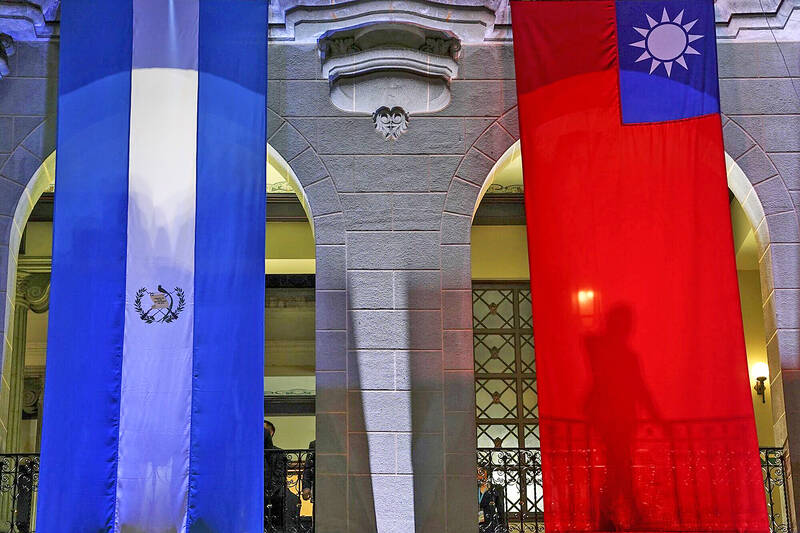Reports from an international affairs think tank and Spanish-language news media have brought to attention how China might leverage its economic power to undermine Taiwan’s relationship with Guatemala, one of the nation’s last remaining diplomatic allies in Central America.
Guatemalan President Bernardo Arevalo has publicly stated he supports his country’s ties to Taiwan, but with China’s capacity to offer financial incentives and its growing influence in the region, it could apply pressure to the country’s political establishment that could potentially lead to the establishment of diplomatic ties.
A recent report from Geopolitical Intelligence Services (GIS), a think tank founded by Prince Michael of Liechtenstein, points to Guatemala’s close ties with the US, which has repeatedly urged the Central American country to maintain formal diplomatic relations with Taiwan.

Photo: Bloomberg
Although Arevalo won 58 percent of the vote in the presidential election last year, the Guatemalan Congress is controlled by opposition parties, which has led to repeated political deadlock.
If Arevalo seeks additional funds to implement his political agenda over the complaints of the legislature, he could look to China as a source of backing, which would inevitably lead to a recalibration in the country’s formal diplomatic ties with Taiwan, the report said.
In recent years, China’s profile in Central America has grown substantially. It has poached several of Taiwan’s former diplomatic allies, such as El Salvador and Honduras, and made major investments in countries such as Costa Rica, also a former diplomatic ally which severed relations with Taiwan in 2007.
Diario Las Americas, a US-based Spanish-language newspaper, published a report on Sept. 9 which quoted two experts from Latin American think tank Center for the Opening and Development of Latin America detailing how countries in the region have grown closer to China in hopes of economic benefits, but have so far seen little results from increasing engagement.
The article raises concerns regarding China’s impact on the region’s socio-environmental systems, workers’ rights and wages, and the lack of transparency in how these countries engage with China.
In recent free-trade agreements (FTA) signed with Costa Rica, Chile and Peru, China has been the primary beneficiary of all three deals, the article states.
In Costa Rica in particular, China’s FTA was a major political victory as the country was the first “domino” to fall in the region and switch diplomatic recognition from Taiwan to China, the article says.
However, since the FTA was signed in 2010, Costa Rica’s trade deficit to China has grown, exports to China have lagged significantly behind exports to the US, and China has yet to make significant investments in the country, the piece adds.
The piece warns that short-term profits from closer ties to China run counter to national interests, and that while China advocates for “win-win” relations, the evidence has yet to materialize.

A strong continental cold air mass is to bring pollutants to Taiwan from tomorrow, the Ministry of Environment said today, as it issued an “orange” air quality alert for most of the country. All of Taiwan except for Hualien and Taitung counties is to be under an “orange” air quality alert tomorrow, indicating air quality that is unhealthy for sensitive groups. In China, areas from Shandong to Shanghai have been enveloped in haze since Saturday, the ministry said in a news release. Yesterday, hourly concentrations of PM2.5 in these areas ranged from 65 to 160 micrograms per cubic meter (mg/m³), and pollutants were

Taiwan’s armed forces have established response protocols for a wide range of sudden contingencies, including the “Wan Chun Plan” to protect the head of state, the Ministry of Defense (MND) said today. After US President Donald Trump on Saturday launched a series of airstrikes in Venezuela and kidnapped Venezuelan President Nicolas Maduro, concerns have been raised as to whether China would launch a similar “decapitation strike” on Taiwan. The armed forces regularly coordinate with relevant agencies and practice drills to ensure preparedness for a wide range of scenarios, Vice Minister of National Defense Hsu Szu-chien (徐斯儉) told reporters before a

EVA Airways on Saturday said that it had suspended a pilot and opened an investigation after he allegedly lost his temper and punched the first officer several times as their plane was taxiing before takeoff at Los Angeles International Airport. According to a report published on Thursday by The Reporter, the incident occurred after the flight’s Malaysian first officer tried to warn the Taiwanese pilot, surnamed Wen (文), that he was taxiing faster than the speed limit of 30 knots (55.6kph). After alerting the pilot several times without response, the first officer manually applied the brakes in accordance with standard operating

NOT AN OPENING: Trump’s violation of international law does not affect China’s consideration in attacking Taiwan; Beijing lacks capability, not precedent, an official said Taiwanese officials see the US’ capture of the president of Venezuela as a powerful deterrent to Beijing’s aggression and a timely reminder of the US’ ability to defeat militaries equipped with Chinese-made weapons. The strikes that toppled Venezuelan President Nicolas Maduro signaled to authoritarian leaders, including Chinese President Xi Jinping (習近平), US President Donald Trump’s willingness to use military might for international affairs core to US interests, one senior official in Taipei’s security circle said. That reassured Taiwan, the person said. Taipei has also dismissed the idea that Trump’s apparent violation of international law could embolden Beijing, said the official, who was not